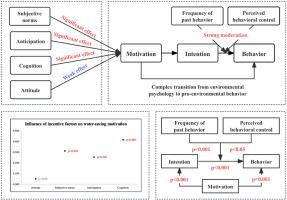基于目标导向行为模型的居民节水激励:来自中国的证据
IF 4.4
3区 经济学
Q3 ENERGY & FUELS
引用次数: 0
摘要
促进居民节水行为对社会可持续发展至关重要。虽然学者们承认动机概念的巨大潜力,并对其与意图进行了明确的区分,但以往的研究主要集中在居民的节水意图上,而忽视了节水动机对节水行为的前影响。为了探讨节水行为的心理决定因素,本研究运用目标导向行为模型来考察动机、意图和实际节水行为等构念之间的相互作用。本研究遵循分层抽样原则,采用随机抽样和滚雪球抽样相结合的混合抽样方法,共收集问卷1184份。对收集到的数据集进行了严格的分析,使用结构方程模型来探索理论关系。结果表明,主观规范、预期和认知对居民节水动机有显著的促进作用,而态度对居民节水动机的影响不显著。此外,动机是节水意愿和节水行为的关键前提。此外,过去行为频率和感知行为控制正向调节意向-行为关系,强化意向向行动的转化。本研究促进了对水资源保护心理机制的理论理解,并为在不同社会文化背景下培养可持续行为提供了实践见解。本文章由计算机程序翻译,如有差异,请以英文原文为准。

Motivating residents to save water based on the model of goal-directed behavior: Evidence from China
Promoting residents' water-saving behavior (RWB) is critical for sustainable societal development. While scholars acknowledge the significant potential of the concept of motivation and make a clear distinction between it and intention, previous studies have primarily focused on residents' water-saving intentions and overlooked the pre-impact of water-saving motivation on water-saving behavior. To investigate the psychological determinants of RWB, this study applied the Model of Goal-Directed Behavior to examine the interplay among constructs, including motivation, intention, and actual water-saving practices. Adhering to stratified sampling principles, a hybrid sampling approach integrating random and snowball methods was utilized to gather data from 1184 questionnaires. The collected dataset underwent rigorous analysis using structural equation modeling to explore the theoretical relationships. Results reveal that subjective norms, anticipation, and cognition significantly enhance residents’ motivation to conserve water, whereas attitude exhibits no significant effect. Furthermore, motivation serves as a pivotal antecedent of both water-saving intention and behavior. Additionally, past behavior frequency and perceived behavioral control positively moderate the intention-behavior relationship, reinforcing the translation of intention into action. This study advances theoretical understanding of the psychological mechanisms underlying water conservation and offers practical insights for fostering sustainable behaviors across diverse sociocultural settings.
求助全文
通过发布文献求助,成功后即可免费获取论文全文。
去求助
来源期刊

Utilities Policy
ENERGY & FUELS-ENVIRONMENTAL SCIENCES
CiteScore
6.80
自引率
10.00%
发文量
94
审稿时长
66 days
期刊介绍:
Utilities Policy is deliberately international, interdisciplinary, and intersectoral. Articles address utility trends and issues in both developed and developing economies. Authors and reviewers come from various disciplines, including economics, political science, sociology, law, finance, accounting, management, and engineering. Areas of focus include the utility and network industries providing essential electricity, natural gas, water and wastewater, solid waste, communications, broadband, postal, and public transportation services.
Utilities Policy invites submissions that apply various quantitative and qualitative methods. Contributions are welcome from both established and emerging scholars as well as accomplished practitioners. Interdisciplinary, comparative, and applied works are encouraged. Submissions to the journal should have a clear focus on governance, performance, and/or analysis of public utilities with an aim toward informing the policymaking process and providing recommendations as appropriate. Relevant topics and issues include but are not limited to industry structures and ownership, market design and dynamics, economic development, resource planning, system modeling, accounting and finance, infrastructure investment, supply and demand efficiency, strategic management and productivity, network operations and integration, supply chains, adaptation and flexibility, service-quality standards, benchmarking and metrics, benefit-cost analysis, behavior and incentives, pricing and demand response, economic and environmental regulation, regulatory performance and impact, restructuring and deregulation, and policy institutions.
 求助内容:
求助内容: 应助结果提醒方式:
应助结果提醒方式:


